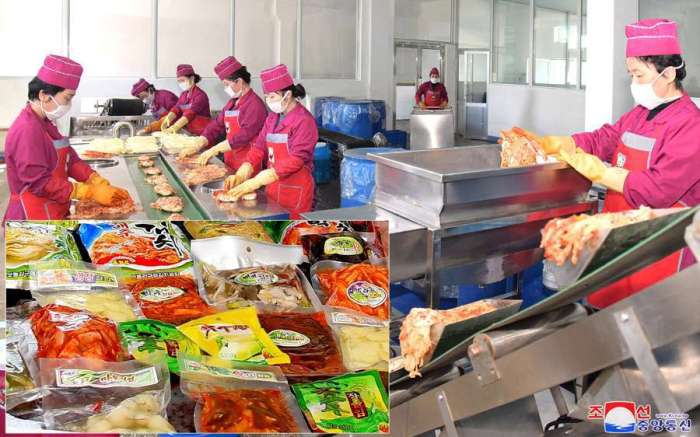Suppose a small city has a kimchi factory. What economic and cultural benefits could it bring to the community? This article explores the potential impact of a kimchi factory on a small city, examining its economic advantages, cultural significance, and environmental considerations.
Kimchi, a traditional Korean fermented vegetable dish, is gaining popularity worldwide for its health benefits and unique flavor. Establishing a kimchi factory in a small city could not only boost the local economy but also promote Korean culture and traditions.
Economic Impact
The establishment of a kimchi factory in a small city can have a significant economic impact on the local community.
Firstly, the factory would create new jobs in various fields, including production, packaging, and distribution. This would not only provide employment opportunities for the local population but also stimulate economic growth in the region.
Secondly, the kimchi factory could boost local businesses by purchasing raw materials and services from suppliers in the area. This would strengthen the local supply chain and support the growth of other businesses.
Examples of successful kimchi factories in other small cities include the Choongjang Kimchi Factory in Jangheung, South Korea, which has created over 100 jobs and significantly contributed to the local economy.
Cultural Significance

Kimchi holds a deep cultural significance in Korean cuisine and beyond.
A kimchi factory in a small city could serve as a cultural hub, promoting Korean culture and traditions. It could host tours, workshops, and events to educate the public about the history and significance of kimchi.
Furthermore, the factory could collaborate with local restaurants and businesses to incorporate kimchi into their menus and products, showcasing its versatility and cultural importance.
Health Benefits

Kimchi is widely recognized for its numerous health benefits.
It is a rich source of probiotics, which support gut health and boost the immune system. Kimchi also contains antioxidants and anti-inflammatory compounds, which may protect against chronic diseases such as cancer and heart disease.
A kimchi factory in a small city could promote healthy eating habits by making kimchi more accessible and affordable to the local community.
Environmental Considerations: Suppose A Small City Has A Kimchi Factory
The establishment of a kimchi factory must consider its potential environmental impact.
The factory should implement waste management strategies to minimize its environmental footprint. This could include recycling, composting, and using sustainable packaging materials.
Additionally, the factory should adopt energy-efficient practices and source raw materials from sustainable sources to reduce its carbon emissions and promote environmental conservation.
Market Analysis
A thorough market analysis is essential to determine the demand for kimchi in the local area.
The factory should identify potential target markets, such as local restaurants, grocery stores, and health-conscious consumers.
It should also research competition and develop a marketing strategy to differentiate its kimchi products and capture market share.
Factory Design and Operation
The design and operation of the kimchi factory should prioritize production efficiency and safety.
The layout should optimize the flow of raw materials, production, and packaging. The factory should also invest in high-quality equipment and machinery to ensure consistent production and maintain high standards.
A comprehensive quality control plan should be implemented to monitor the safety and quality of kimchi products throughout the production process.
Workforce and Training

The kimchi factory will require a skilled workforce to operate efficiently.
The factory should develop training and development programs to equip employees with the necessary knowledge and skills. This could include training in kimchi production techniques, food safety protocols, and quality control procedures.
The factory should also consider partnering with local educational institutions to provide internships and training opportunities for students interested in the food industry.
Community Involvement
The kimchi factory should actively engage with the local community to build support and foster a sense of ownership.
The factory could support local events, charities, and community initiatives. It could also offer educational programs and tours to raise awareness about kimchi and its cultural significance.
By involving the community, the factory can create a positive and lasting impact on the local area.
Popular Questions
What are the economic benefits of a kimchi factory in a small city?
A kimchi factory can create jobs, boost local businesses, and increase tax revenue for the city.
How can a kimchi factory promote Korean culture?
A kimchi factory can host cultural events, offer tours, and provide educational materials about kimchi and Korean cuisine.
What are the health benefits of kimchi?
Kimchi is a good source of probiotics, vitamins, and minerals. It has been linked to improved digestion, reduced inflammation, and a stronger immune system.